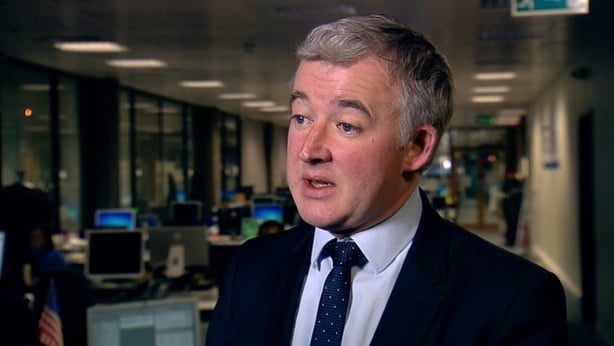Sinn Féin has defended its call to scrap the Hate Crime Bill in the face of criticism that it had previously supported the legislation.
The party's TDs voted in favour of the Bill in the Dáil last April.
Finance Spokesperson Pearse Doherty said they had not supported the Bill in the Seanad and had voted against it in the upper house last June.
"We had raised serious concerns with this legislation right through the process and had tabled a number of amendments," he said.
"The Government in its arrogance refused to listen, not only to Sinn Féin's amendment but also to the other amendments that were coming from the opposition."
Mr Doherty said it was time to stop the "farce" of the Bill as he said too much time had been spent on the proposed legislation, which did not have cross party support.
A spokesperson for Minister for Justice Helen McEntee said amendments are still being examined in relation to the Bill, but the intention remains to pass the legislation in the lifetime of this Government.
Fine Gael leader Simon Harris said yesterday that the legislation was in the Programme for Government and that legitimate questions had been raised about its content.
He said politicians should approach these issues with humility and that he would expect there to be revisions and amendments to the legislation.
Separately, Sinn Féin's Education Spokesperson Donnchadh Ó Laoghaire said the party would not rerun either of the two recent referendums if it was in Government.
Previously, party leader Mary Lou McDonald had indicated that Sinn Féin would revisit the care referendum if it did not pass.

Meanwhile, the Executive Director of the Irish Council for Civil Liberties has said the Hate Crime Bill deals with hate crime legislation and amending the 1989 Incitement to Hatred Act, and that gardaí and the criminal justice system are calling for these changes.
Liam Herrick said that what they have witnessed in recent years was an increase in people being attacked, being victims of assault, arson, damage to property "and even murder because of who they are".
Speaking on RTÉ's Morning Ireland, Mr Herrick said they were seeing homophobic and racist violence increasing.
"The Garda Síochána and the criminal justice system want to properly record and respond to this crime problem," he said.
"They are calling out for clear legislation that would provide them with the basis to do that in terms of incitement to hatred.
"We have legislation since 1989, but again, the guards and the DPP have said the current legislation is unworkable and it also needs to be updated to include other grounds of discrimination, such as people being victimised because of their disability or their gender."
Mr Herrick said the Bill has been before the Oireachtas for three years and it is now due to go back to Seanad.
He said that there are changes that do still need to be made to the legislation.
"There's pretty much broad consensus on the hate crime issues, where there's very little opposition," he said.
"But in terms of the incitement to hatred, the Irish Council for Civil Liberties and people across all parties in the Oireachtas have identified concerns around freedom of expression and at the moment we're at the point where it's just about to go back to third stage in the Seanad and those freedom of expression issues still need to be resolved."
Mr Herrick said there "certainly" needs to be amendments and revisions, and there have been proposals across all parties in the Oireachtas to try to deal with the issues.
"The issues are quite technical but also quite important. So, we need a very explicit and clear defense of freedom of expression to ensure that journalists and others are not criminalised by the legislation.
"We need to either remove or significantly tighten offences around the possession and preparation of material and we also need clear definitions in the legislation."
We need your consent to load this rte-player contentWe use rte-player to manage extra content that can set cookies on your device and collect data about your activity. Please review their details and accept them to load the content.Manage Preferences
Mr Herrick added that there is likely to be some movement on those and he welcomed Simon Harris's "willingness to accept amendments in this area, whether they go far enough or not, I think needs to be addressed.
"But that discussion about real amendments and real issues is quite separate to what we've seen over the last couple of days with backbenchers in Fianna Fáil and Fine Gael, all of whom who voted for the legislation in the Dáil, didn't propose any amendments, and now we're making some vague sloganeering around why they're against the bill without saying what they're against."
On a definition of hate, Mr Herrick said the Irish Council for Civil Liberties and the Coalition Against Hate Crime favour a definition of hate.
He said there are international legal standards which can be used here to provide clear definitions and legislation.
"And what we would respectfully say is that the lessons of the recent referendums are that the public wants clarity around legislation," he said.
"They want to understand the definition of terms, and I think that that is still a difference between where the Government stands and where ourselves and civil society stands.
"We agree that there should be clarity and definition, if not in the interpretation section on the Bill, then the minister must find other ways of providing clarity about what certain terms mean."
Fine Gael leader Simon Harris said yesterday that the legislation was in the programme for Government and that legitimate questions had been raised about its content.
He said politicians should approach these issues with humility and that he would expect there to be revisions and amendments to the legislation.







